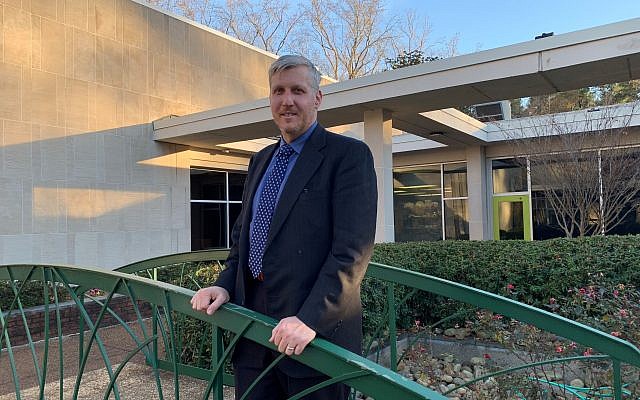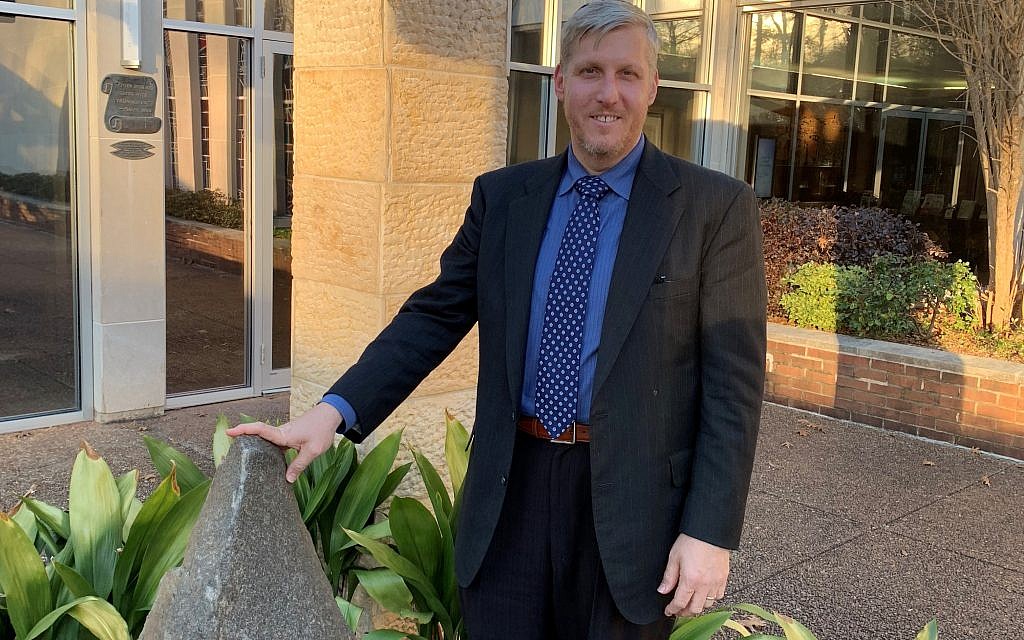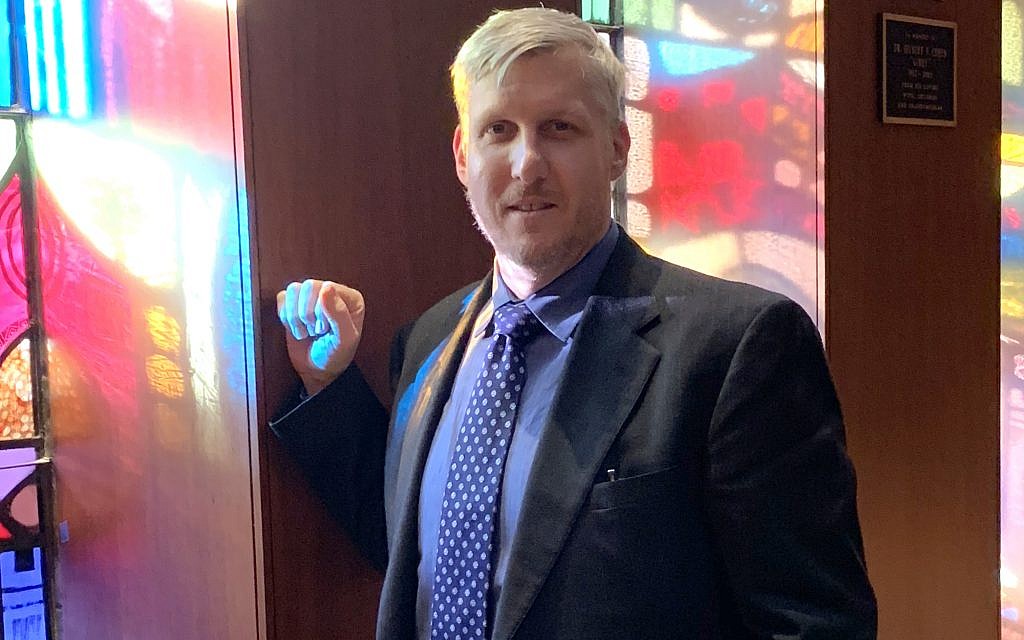The Dawn of a New Day at AA
Ahavath Achim Synagogue, one of Atlanta’s oldest congregations, transitions its lead clergy position from Rabbi Neil Sandler to Rabbi Laurence Rosenthal.
After 37 years with the Atlanta Journal-Constitution and now with the AJT, , Jaffe’s focus is lifestyle, art, dining, fashion, and community events with emphasis on Jewish movers and shakers.

Changing of the guard, passing the torch and l’dor v’dor are all visualizations of the cresting wave as Ahavath Achim Synagogue, one of Atlanta’s oldest congregations, transitions its lead clergy position from Rabbi Neil Sandler to Rabbi Laurence Rosenthal. Rosenthal, who served as the assistant and co-rabbi for the past decade, is slated to imprint his vision, vitality and creativity on the membership of more than 800 families pending a congregational vote this spring. Brimming with geniality, the musician and father of four listened, observed and questioned before taking on his new position. Below, he shares his thoughts on how the congregation can further establish connectivity through communal life and spirituality by “breaking through the noise.”
Jaffe: Two other Conservative synagogues in Atlanta also recently changed over to “younger” head rabbis. Have you formed some cadre with them?
Rosenthal: Rabbi Ari Kaiman and I have a close relationship from attending rabbinical school together. Rabbi Daniel Dorsch and I met during our time together in Atlanta. They are both bringing amazing energy and creativity to their congregations and the Jewish community. As vice president of the Atlanta Rabbinical Assembly, I have the opportunity to work closely with many community rabbis. We are blessed to have incredible Jewish spiritual leadership in Atlanta, and as the president-elect of the ARA, I look forward to continuing this collaborative work.
Jaffe: Historically, you are the only head rabbi at AA who first served the congregation as the assistant rabbi.
Rosenthal: Over the past decade, I have fallen in love with the congregation. The people are really the core of the Ahavath Achim experience. I know many families intimately, as I have been with them through joy, sorrow, pain and triumph. I am humbled and honored the congregation is looking to me to lead them forward at this time.

Jaffe: Noting the changes you implemented for this past High Holiday season: the Torah procession through the building; blending the tent and sanctuary services; offering a pre-service meet-and-greet reception on Rosh Hashanah, what other changes are you considering?
Rosenthal: I am focusing on finding meaningful ways to engage in our spiritual tradition, ritual and prayer. This requires a lot of listening, observing and questioning. We are now asking, “Why are we doing this? What is the core purpose of this practice?” Then, we attempt to infuse a meaningful, conscious approach to it all.
For instance, when looking closely at our Saturday morning Shabbat service, the crowd always arrives closer to 10 a.m. So, we are shifting the start time from 9 to 9:45 a.m. and ending at noon. We’ll spend the morning in prayer and engaged in the spirituality of reading from the Torah. Then, a Rabbi’s Tisch (table) will take place during Kiddush lunch to hear a sermon, offer blessings for our weekly celebrants, and to share in song and camaraderie.
In an effort to continue processing these experiments and changes, the Rabbi’s Tisch is also going to be a time for us to hear from our congregants. It’s not about me … it’s about us. The future of the congregation is about our collective journey and each of us owning our part of the spirituality.
Jaffe: Do you think synagogue membership in Atlanta is overly fragmented with so many new intown congregations? What is AA’s niche vis-a-vis the re-gentrification of the center city?
Rosenthal: Many people are moving back to the city’s core to find meaningful, communal living experiences and are searching for personal and purposeful community connections. The synagogue has a special place in this landscape. Regarding other synagogues and their place in the landscape, I don’t see them as competition. One of the lasting legacies of Rabbi Sandler is to see the community as working together rather than apart. As he taught me, “Rising waters lift all ships.”
Jaffe: What advice would you give to parents rearing young children?
Rosenthal: I am blessed with a very special partner, Brooke, in my life. For me, my parenting starts by respecting and honoring that relationship. Together, we turn to our children and make sure we are listening to them. With four children — 12, 10, 8 and 6 — you can imagine it’s not always easy! However, by listening carefully, we are better able to see the world through their eyes and to be challenged and enriched by their spiritual acumen and depth of soul.

Jaffe: You’re a great dad and musician. What’s your idea of spending a cool day away from the pulpit?
Rosenthal: My day off is usually spent doing yoga, playing tennis and playing through the “Jazz Fake Book” with friends. At AA, I found an incredible cadre of musicians who are synagogue members. We put together a group and are performing a combination of my original compositions and traditional guitar blues at the Jan. 13 Atlanta Jewish Life Festival at the Georgia Aquarium. Additionally, part of my day off is spent with my kids: carpooling, kung fu practice, homework.
Jaffe: What do you consider your biggest strengths?
Rosenthal: I did not grow up as an observant Jew. When I was really young, I remember having Friday night dinner at home. However, after my parents separated, Shabbat dinner became sushi at a local restaurant. We would show up to High Holiday services late and leave early. No youth group, no Jewish camp or day school.
I found my way back to my Jewish heritage with the guidance of loving, caring and patient rabbis from the local Los Angeles Kollel network. I vividly remember what those first steps back into religious, spiritual community felt like – scary, foreign, judgmental and ignorant.
My strength lies in remembering what it was like to live differently. What we all have in common is our search for new ways to connect with each other, our tradition, our heritage and ourselves. My job is to help them find and to cultivate those meaningful connections.



comments